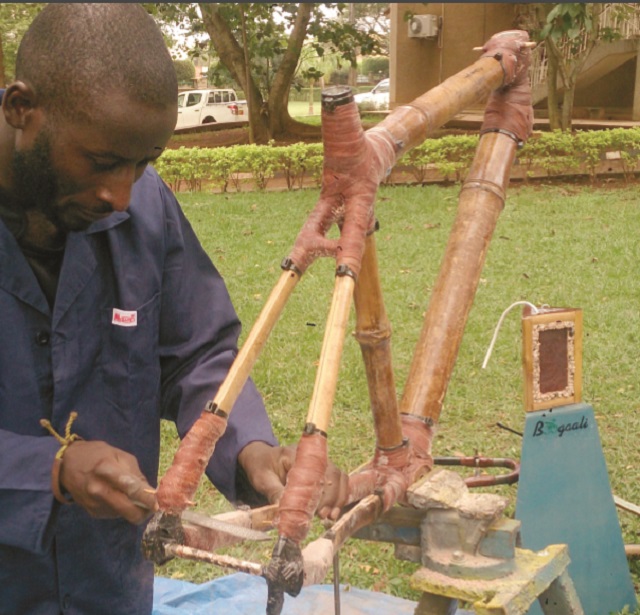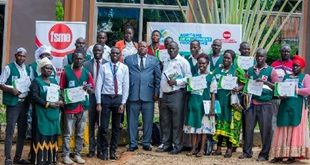
Kasoma’s beautiful, environmental friendly alternative to metallic bicycles
Kampala, Uganda | ANDREW S. KAGGWA | Jesus Christ on a wooden bicycle!
That is an expression often used to show surprise, shock and disbelief. It could easily come to mind, for example, once someone tells you that there are bicycles made out of bamboo in Uganda.
But a group of youth in Uganda is actually minting money by making bamboo bicycle frames which they mostly export to European countries – and on order.
While many people cannot believe that bamboo is strong enough to carry someone’s weight, Noordudin Kasoma and his team believe bamboo is the perfect material for making bicycle frames.
Kasoma would know. He rides bicycles as a hobby and used to be a competition rider with Tropical Heat Riding Club in Katwe, a Kampala city suburb.
“We decided to use bamboo because it has the ideal properties suitable for bicycle construction, As a material, bamboo has excellent vibration dampening effects and effectively absorbs all bumps on the road when one is riding,” Kasoma explains.
His bamboo bicycles were a hit at the recent Bamboo Exhibition organised by the Uganda Bamboo Association at the National Forestry Authority headquarters at Bugoloobi between September 4 and 8. Many curious visitors took test rides on the two bicycles made with bamboo frames which he exhibited.
“It’s a comfortable ride and I now no longer have any doubts about the strength of the bamboo bike,” said an excited William Okello, a resident of Luzira who weighs 83kgs, after doing the test ride.
Kasoma says international research was made in the universities in US, Switzerland and UK which found bamboo a good material for bicycle making. He adds that bamboo is beautiful and makes more attractive bicycles than those made of metal.
Kasoma explains that he called his company BOOGAALI Bikes Uganda Ltd because “boo” is the last part bamboo and ‘’gaali’ means bicycle in Luganda and many Ugandan languages. So Boogali actually means many bicycles.
Kasoma, who trained in electrical installation, shows many such sparks of creativity. But he says he was first trained in bamboo craft by an American instructor, Craig Calfee, in 2011 at the Entrepreneurship Institute of Technology in Lubaga, Kampala. His team started making the bamboo frames in 2013 and currently exports the ready frames on order to the Netherlands, Belgium, and Sweden.
He has five permanent employees at his workshop at Zzana on Entebbe Road in Wakiso District. He also trains students from vocational institutions.
To make the bamboo frame, Kasoma and his workers first have to find stems of the size that would meet a customer’s specifications. He said this easy because many people have not yet appreciated the value of bamboo and sometimes even give him the bamboo stems free of charge or cheaply. He only needs to find the labour to cut them down, he explains. The best bamboo, which is straight, is only available in Kisoro in South Western Uganda transport stems means incurring additional transport costs.
After they get the stems, they measure out the pieces and dry them in the sun which strengthens them. Then they apply sand paper to make them smooth and beautiful.
To strengthen the joints when joining the frame, Kasoma says they use a bark cloth (olubugo) from the bark tree (mutuba in Luganda). This too has been tested in foreign laboratories and found to be strong if woven in the right way.
“The bark cloth is not only environmentally friendly but light and easy to handle and turn into any shape, once dipped into a resin and dried,” Kasoma explains. Since the bamboo stem is hollow, they add metal parts they import to join the frames.
Kasoma says he can produce only 10 frames in three months as most of the work is done by hand and it takes one worker between 10-20 days to complete one frame.
“Sometimes it becomes very hard for us to satisfy our orders because we do most of the work by hand as we do not have the necessary equipment like our colleagues who make bamboo bikes in the developed countries do. So at times international customers who have big orders or need their bamboo bicycles urgently prefer to give the orders to makers in other countries,” he explains.
 The Independent Uganda: You get the Truth we Pay the Price
The Independent Uganda: You get the Truth we Pay the Price


